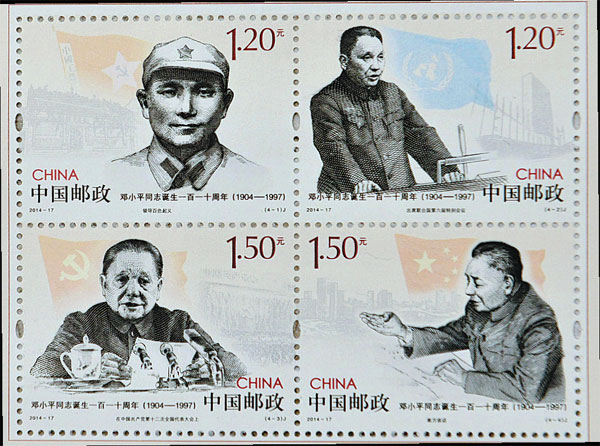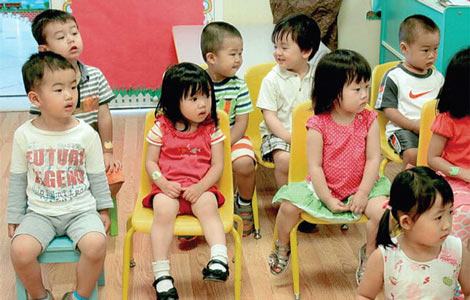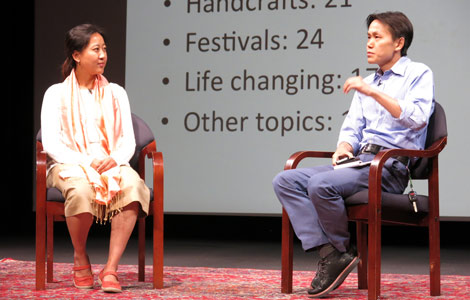In reforms, China will never 'copy' others: Xi
Updated: 2014-08-21 11:09
By Zhao Shengnan in Beijing and Zhang Yuwei in New York(China Daily USA)
|
||||||||
Chinese President Xi Jinping warned on Wednesday against blindly copying the experience of other countries amid China's ongoing reforms.
His remarks came at a symposium in Beijing, the latest in several high-profile activities marking the 110th anniversary of the birth of late leader Deng Xiaoping, which falls on Friday.
"We will try our best to reform areas that are weak and unsound and learn from the good experience of the international community," Xi said. "But we will never blindly copy the experience of other countries, let alone absorb bad things from them."
|
China Post will issue a set of stamps on Friday marking the 110th anniversary of the birth of former leader Deng Xiaoping. Long Wei / For China Daily |
China would never belittle itself or forget its roots, Xi said, adding that history had shown that the only way to solve problems in China was for the country to do so in its own way, based on its "own reality".
All seven members of the Political Bureau Standing Committee of the Central Committee of the Communist Party of China attended the symposium in the Great Hall of the People.
Observers from China and the United States said the large number of activities held nationwide recently underscored the leadership's determination to carry out reform that was appropriate for China's needs, just as Deng had done.
Deng emerged as leader in the years after the death of Chairman Mao Zedong in 1976. His sweeping economic reforms changed the face of China over two decades and saw it emerge as an economic giant.
Xi said Deng's most important political and theoretical legacy was socialism with Chinese characteristics, which the Party and people created under Deng's leadership.
Zhiqun Zhu,director of theChinaInstitute and professor of political science and international relations at Bucknell University, said Xi is "resolute and decisive" and "much like Deng".
"Xi's reform is well-paced," said Zhu. "He is tackling corruption first - probably the most serious and most hated problem with the Party, which is why he has received widespread popular support."
Jon Taylor, a professor of political science and avid China watcher at the University of St Thomas, said Xi's reform plan offers comprehensive measures - such as overhauling state enterprises and spurring the private sector - which show that the leadership is aware of the major issues in China.
"The reforms implemented so far in administration, finance, trade, market access for foreign investments, urbanization and 'townization', and investment liberalization in the service sectors can or are beginning to meet with success," said Taylor.
Wu Hui, professor of Party-building at the CPC Central Committee's Party School, said Xi's remarks highlighted his vigilance against "subversive mistakes" during reforms.
"China is at a crossroads, with both achievements and problems. The leadership aims to make full use of, and improve, its socialism without allowing populism or nationalism to sabotage democracy and the rule of law," he said.
Professor Xie Chuntao from the Party School said the opportunity to commemorate Deng was a chance to publicly demonstrate confidence in new breakthroughs.
"As reform enters the 'deep water zone', we need the daring spirit of Deng's era," Xie said.
Contact the writers at zhaoshengnan@chinadaily.com.cn or yuweizhang@chinadailyusa.com.
(China Daily USA 08/21/2014 page1)
Most Viewed
Editor's Picks

|

|

|

|

|

|
Today's Top News
Lawmakers in move to tackle espionage threat
Airplanes' skirmish still debated
Mugabe a frequent visitor to China
Australian MP apologizes for insulting Chinese
US hypersonic weapon destroyed seconds after launch
Cathay Pacific to launch new Hong Kong, Boston route
Duke Kunshan welcomes its first class in China
Consulate pioneers Facebook-diplomacy
US Weekly

|

|















